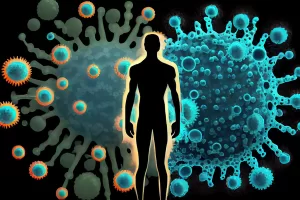Parasitic infections occupy one of the first places in terms of the degree of damage to the health of the Earth’s population today. In this regard, timely recognition and proper treatment of persons with parasitic diseases are relevant today more than ever.
What Are Parasitic Infections
WHO reports that at least 4 billion people worldwide are affected by parasitic infections, tens of millions of them die every year from this cause. Such infections are a group of diseases caused by parasites (protozoa, helminths, and ectoparasites), i.e. organisms that use the human body as a source of food and habitat.
How Parasites Infect Humans
Parasite infestation typically occurs through soil contaminated with feces. For example, if you do not wash your hands and do not clean your nails after gardening, eat dirty vegetables, fruits, and berries.
Flies also play a significant role in infestation. They use their paws and proboscis to transfer worm eggs to various products, especially meat and fish. Therefore, when you cook at home, do not forget the importance of thoroughly washing meat and fish, as well as the need for sufficient heat treatment.
Infection is also possible when accidentally swallowing water while swimming in reservoirs. Children are often infected with parasites from pets.
The body of a healthy person creates a triple protective barrier against parasites. Enzymes of the oral cavity, the acidic environment of the stomach, and the local immunity of the intestine quickly eliminate parasites from the body. Unfortunately, these barriers may not work if a person is weakened. Then the parasites freely enter the organism and begin their activity.
According to the famous PhD William B. Campbell, a person with an infectious parasitic disease eventually becomes poisoned by the waste products of the parasites. The patient’s fatigue increases, appetite worsens, and headaches appear. The work of the digestive tract is disturbed. Hypersensitivity to allergens, skin rashes, and deterioration of the immune system are the first signs of parasite activity.
Common Parasitic Infections
The most common parasitic infections include Protozoan, Helminthic, and Ectoparasites. Read more about each in the paragraphs below.
Protozoan (Malaria, Giardiasis, Toxoplasmosis)
Protozoal infections are caused by parasites belonging to the type of unicellular protozoa. They parasitize in various organs and tissues: the blood, intestines, central nervous system, liver, lungs, etc. Pathogens are transmitted through the alimentary route, through arthropod vectors, and sexually.
Malaria, Leishmaniasis, Toxoplasmosis, Giardia, Trichomoniasis, and Amoebiasis have the greatest medical and social significance among this type of infection.
Helminthic (Roundworms, Tapeworms, Flukes)
Helminthic infection is a parasitic disease caused by Roundworms, Tapeworms, Flukes, and other types of worms. It is usually chronic and has a systemic effect on the human body. Helminths secrete toxic substances that enter the bloodstream and spread to all human organs and tissues. Therefore, it is not surprising that many people want to know what fights parasitic worms quickly and effectively.
Ectoparasites (Lice, Bedbugs, Fleas)
Ectoparasites live on the integument of the host’s body. Among the most common are lice, bedbugs, and fleas. You may think that they are completely safe and cannot cause harm, but in fact, everything is completely different. They cause itching, dermatitis, allergies, and carry dangerous bacterial and viral infections (for example, Lyme disease). Therefore, you need to fight them the same way you fight parasitic worms.
Symptoms of Parasitic Infections
The above confirms that the list of parasitic infections is quite extensive. Accordingly, there are several clinical syndromes and their characteristic symptoms that indicate that you should think about fighting parasites:
- Intoxication (weakness, increase in body temperature, decreased body weight);
- Intestinal (abdominal pain, nausea, vomiting, stool disorder);
- Anemic (pallor of the skin and mucous membrane);
- Skin (dermatitis, urticaria, edema);
- Respiratory (cough, symptoms of obstructive bronchitis, transient pulmonary infiltrates);
- Cholestatic (pain in the right hypochondrium, nausea, hyperbilirubinemia);
- Lymphadenopathy;
- Hematological (leukopenia, hypoproteinemia, dysproteinemia, a significant increase in IgE levels).
Practice shows that each specific type of parasite is characterized by its own set of syndromes that appear at different periods of parasite development. Clinical symptoms also depend on the stage of the infectious process. They are more pronounced in the acute period and may be practically absent in the chronic process.
Diagnosis
If you suspect a parasitic infection, you should not self-medicate but consult a doctor. The diagnosis is confirmed by stool analysis for helminth eggs and cysts of protozoa. If no parasite eggs or cysts are detected during the first test, but the likelihood of infection is high, the analyzes are repeated several times.
The blood test also plays an important role in the diagnosis of a parasitic disease and determines the choice of the appropriate therapeutic drug. A complete blood count and leukocyte formula determines whether helminthiasis or parasitosis is invasive, and also reveals anemia associated with infection. Invasiveness is evidenced by elevated levels of eosinophils. Iron deficiency anemia indicates amoebiasis or other long-term infection.
The use of imaging techniques allows to get detailed images of certain areas inside the body. Such a diagnosis is especially useful when the patient has Neurocysticercosis or cerebral Toxoplasmosis.
Fighting Parasitic Infections
Both traditional medicines and natural remedies can be used in the treatment. The list of medications is provided below.
Ivermectin (Stromectol)
It is an antiparasitic drug with a wide spectrum of activity. It is active against skin parasites and all types of helminths (Onichocercosis, Strongyloidosis, Ascariasis, Trichocephalus, Filariasis (a group of tropical transmissible Helminthiasis), Enterobiasis, as well as Cryptosporidiosis caused by microscopic Cryptosporidium organisms).
Praziquantel
Praziquantel is a quinoline derivative with an anthelmintic action. The drug is indicated for internal use, effective against Chinese liver fluke, Schistosoma mansoni, cat fluke, Japanese schistosome, and broad tapeworm.
Mebendazole and Albendazole
Mebendazole and Albendazole are one of the most common anthelmintic drugs on the modern pharmacological market. Their action is aimed at disrupting the vital functions of parasitic worms, as a result of which they lose the ability to synthesize ATP, assimilate glucose, and die. Main indications for use: Pinworm infection, Ascariasis, Echinococcosis, Cysticercosis, and Strongyloidiasis.
Metronidazole (Flagyl)
Metronidazole belongs to antimicrobial agents for systemic use. It is effective against Peptostreptococcus spp., Clostridium spp., Porphyromonas, Bilophila, Helicobacter pylori, Bacteroides spp., Fusobacterium spp., Prevotella spp., Veilonella.
Natural Remedies
Folk medicine has accumulated many recipes for getting rid of parasites without pills. If the case of infection is confirmed, you can use wormwood, garlic, pumpkin, Achillea millefolium, etc. They do not harm the body when used correctly and, in addition to the antiparasitic effect, strengthen the immune system. However, the effectiveness is much lower compared to medications, and allergic reactions are possible with individual intolerance.
Surgical Treatments
Treatment of some patients with parasitic infections may require surgery. It is appropriate, for example, in cases where it is necessary to remove cysts or abscesses, as well as when Alveococcosis or Cysticercosis is diagnosed.
Summary
There are a huge number of bacteria and parasites that can cause serious human diseases. Therefore, it is important to monitor your health responsibly and consult a doctor in case of the symptoms described in this article. The specialist will choose the most appropriate method of treatment and help solve the problem.
FAQ
Can antibiotics treat parasitic infections?
Antibiotics are not effective against helminths and other parasites in the human body.
How do I cleanse my body from parasites?
There are good traditional medicines you can use, for example, Ivermectin, Mebendazole, Albendazole, Praziquantel, or Metronidazole. But consultation with a doctor before taking the drug is mandatory.
Can parasitic infections be cured?
Parasitic infections can be cured. The main thing is to determine the correct diagnosis and choose the appropriate treatment.
What is the most effective treatment for parasitic infections?
It depends on the type of parasitic infection and its cause. But Albendazole is quite effective against many parasites.
Can your body fight off parasites?
During a parasite infection, a healthy immune system produces antibodies that help fight the infecting organism.



